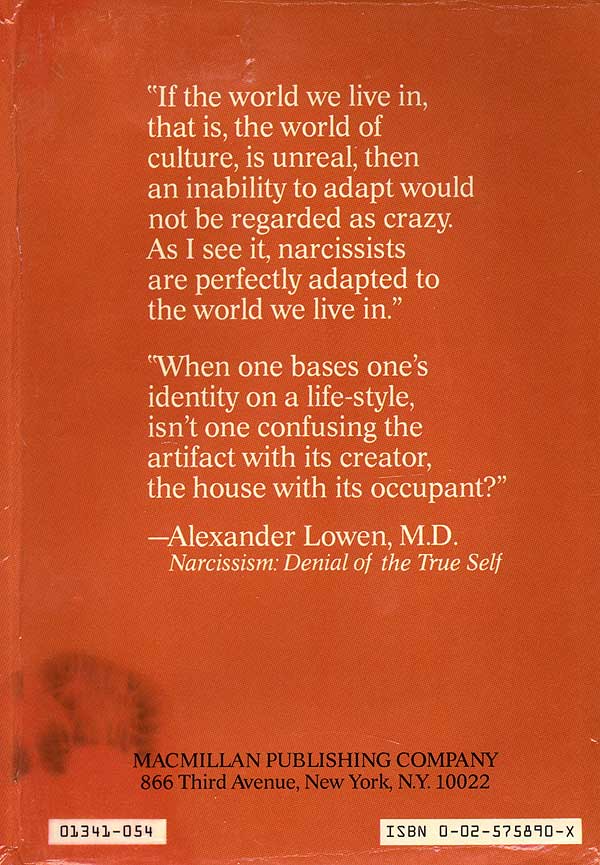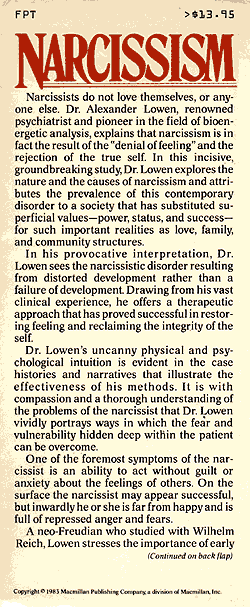





Great CPYU article on Narcissism and today's youth culture by Walt Mulluer
Narcissism. It’s a cultural reality we must seriously consider if we hope to effectively understand and reach our kids.
Narcissus is the youthful Greek mythological character who couldn’t take his eyes off his own reflection. Self-absorbed, his world revolved around nobody or nothing but himself. It wasn’t until I was a college senior that I remember hearing about Narcissus, even though I had already embraced him a bit—probably a lot more than I ever realized—as a part of my life. Cultural analyst Christopher Lasch had just released a new book on self-centeredness in American culture, The Culture of Narcissism, and it was assigned reading in a sociology class. Lasch believed that as a result of the political turmoil of the 1960s, Americans had retreated into themselves and were focusing solely on personal preoccupations. This type of living in the moment cut all ties to the traditions, rules, conventions and cultures of the past. “I” became the center of the universe and source of reality and morals. The narcissist thought of himself in the here and now, became his own audience, but also loved an audience of others who were equally enamored with who he was.
Lasch’s “culture” of narcissism has snowballed to the point where it’s even more deeply embedded and entrenched in the fabric of today’s students, a generation that’s inherited the legacy of their self-absorbed ancestors to become second- and third-generation narcissists. Researchers at
If we desire to see our children and teens fulfill their calling as the church in the world, we must reckon with how the world might actually be in them as they function as the church. In other words, if we want to see our kids live out and communicate the selfless
A look at our contemporary church and youth ministry culture offers plenty of discouraging evidence that the culture of narcissism has indeed, shaped who we are.
First, there’s our love affair with money and wealth. The great unaddressed sin of the church is materialism, defined by Webster’s Dictionary as, “the doctrine that the only or the highest values or objectives lie in material well-being” and “a preoccupation with or stress upon material rather than intellectual or spiritual things.” When we place ourselves and our interests at the center of the universe, there’s nothing wrong with selfishly pursuing and accumulating as much as we can. Hammered by a marketing machine that exploits their youthful anxieties and aspirations, today’s teenagers are being socialized into narcissism, and they are eagerly embracing materialism as a lifestyle.
Second, there’s our theology … a theology that has demoted almighty God from his rightful place at the center of the universe, and replaced God with a god made in our image who comes running when we snap our fingers to serve us and cater to our needs. Christian Smith’s not-quoted-enough research on the shape of teenage faith offers convincing proof that narcissism has led to a self-defined faith that is also very self-serving. In his book Soul Searching, Smith notes that just like their adult counterparts, American kids are “profoundly individualistic, instinctively presuming autonomous, individual self-direction to be a universal human norm and life goal.” This individualism is “an invisible and pervasive doxa that is unrecognized and unquestioned,” and it informs the shape of their faith (p. 143). The resulting faith is what Smith has labeled “moralistic, therapeutic, deism.” Stated simply, this lethal distortion of orthodoxy has kids believing that I must be a good person, be happy, feel good, and that I can call on the God who exists for me whenever I need something. This type of faith not only multiplies and thrives when fed by a narcissistic culture, but it feeds and encourages the spread of narcissism. Could it be that our faith has been shaped less by God’s story, and more by our culture of narcissism?
Third, there’s our increasingly human-centered corporate worship, particularly the songs we sing as we gather together. In a narcissistic world, the criteria for “good worship” is that worship leaves me “feeling good.” Rather than centering on God and God’s character, worship’s content and focus is centered on me. When it does mention God, God exists because of what he can do for me. Yes, God has done and continues to do great things for us, and for that reason we should bow down and worship. But in today’s culture of corporate worship, are we really bowing down to God? If you want to put what I’m saying to the test, ask your kids this question: “What makes worship good?” Many of them will answer in ways that reveal their narcissism.
Fourth, there’s the disturbing shape of our faith in practice. In his book The Culturally-Savvy Christian, Dick Staub describes our narcissistic faith as “Christianity-lite”—it tastes great, it’s less filling and it’s the source of spiritual impoverishment. Dick says it’s a faith that produces conversions rather than disciples. In practice, what results is an army of people who take the name “Christian,” but instead of living a life marked by self-denial and sacrifice, the army embraces the wonderful promise of heaven for their future, while pursuing the American dream. The result, Staub says, is “that Jesus would not recognize the message and practices of Christianity-lite” (p. 47).
Fifth, there’s our emphasis on spiritual consumerism over spiritual conviction. There’s no denying the fact that narcissism and materialism have combined in a mix that shapes our message and methodologies: we treat people as consumers who need to be won over by marketing efforts that convince them to choose our church, rather than calling them to the self-sacrificing life of carrying one’s cross. We are spending more time becoming what people want, rather than focusing on frankly telling people what it is that they need. Church and faith have become commodities to market and sell. The sad reality is that in a narcissistic world, there’s not much of a market for a faith that’s not all about me. The temptation is to water down “the product” so that it will sell. Perhaps we should take some of the blame for socializing kids into shopping for faith in the same way they shop for a pair of jeans.
The culture of narcissism takes adherents—especially easily influenced kids—down the wide road that leads to destruction. How can we counteract this focus on self, and lead kids into a lifetime spent on the narrow God-centered road that leads to life? I don’t think there are any easy answers. I do, however, believe we need to look in the mirror to evaluate what we say and do. Here are some initial steps we can and must take to counteract narcissism’s powerful and pervasive influence.
First, understand the importance of studying and teaching theology. All of us teach theology, whether we do so consciously or unconsciously. If we aren’t consciously pursuing a deeper knowledge of God, we might be unconsciously promoting all types of heresy—including narcissism—without even knowing it. If our mission is to serve as signposts pointing to God, making an effort to consciously know and teach the God we point to will go a long way in exposing narcissism’s lies while promoting God’s truth.
Second, deliberately promote a theistic world and life view. Sure, we’re doing that already, but the culture of narcissism dictates that we can’t do it enough. Kids need to be reminded over and over that all of life is to be God-centered, not me-centered. Some of the most timely and foundational words in Rick Warren’s best-selling Purpose Driven Life are the first four words of the book: “It’s not about you.” Narcissism’s incompatibility with the Christian faith was addressed several hundred years ago when the framers of the Shorter Catechism—a tool employed to teach children the basics of the Christian faith—wrote that the chief end of all humans is “to glorify God”—not self—and “to enjoy him forever.” Jesus turns narcissism on its head when he tells his disciples, “If anyone would come after me, he must deny himself and take up his cross daily and follow me” (Luke 9:23). Take every opportunity to point out the centrality of God—not self—in all of life.
Third, shape your worship to focus on the audience of One. Times of corporate worship shouldn’t be about entertaining kids. While I’m sure none of us do this intentionally, it’s something that still happens too often. God is not the performer when we gather to worship. The gauge of “good” worship isn’t how our kids score their experience on personal fulfillment and pleasure while walking out of the room. God is the audience and we perform for Him. Carefully examine, evaluate and choose worship elements that focus on the character, acts and will of God, along with what constitutes an obedient response to God’s initiative on the part of your kids. Even more importantly, don’t allow your kids to fall into the trap of believing that worship is nothing more than singing popular praise choruses. The reality is that worship is what we’re called to be about 24/7 through our constant devotion to God in all the activities of life. Narcissistic devotion to self is simply idolatry.
Fourth, lead your students into a God-centered lifestyle. Our kids are raised in a culture that tells them “it’s all about you.” The result is a lifestyle of selfish indulgence marked by greed and entitlement. As people charged with the task of leading them to spiritual maturity, our goal should be to see their eyes and energies focus less and less on self, and more and more on God while embracing his will. The prophet Amos delivered a message that rocked the world of those who thought they were following God. Through Amos, God said “I hate,” “despise,” “cannot stand” and “will not accept” your offerings and worship. Instead, what God wanted was justice that rolled on like a never-ending river and righteousness like a never-failing stream (Amos 5). Likewise, the prophet Micah made it clear that God requires that his followers “act justly,” “love mercy” and “walk humbly before God” … actions and postures contrary to a narcissistic lifestyle. Youth ministries and families must be more intentional about offering students opportunities to learn how to faithfully live a life marked by selfless devotion to God through selfless devotion to missions, service and justice.
Finally, pray for crisis to enter the lives of your kids. Narcissism plays and advances well in a culture that feeds the beast of self-absorption from a deep well of luxury and wealth. Sometimes it’s not until the well runs dry through poverty, want or crisis that our students understand their thirst for what it really is—a longing not after self, but after God. While students might not see it as such, it’s a blessing when the clay feet on which a narcissistic lifestyle is built crumble to dust. Sadly, that’s oftentimes what it takes for them to reach out to their heavenly Father. As John Stott reminds us about the prodigal son, “he had to ‘come to himself’ (acknowledge his self-centeredness) before he could ‘come to his father.’” While we hate to see our kids hurt, sometimes their idolatrous obsession with self must be broken down before they can be built back up in Christ.
When I was a teenager, my dad was known around our house for his ever-ready arsenal of clichés—many of which were directed at me and all of which, at the time, I would have rather not heard and just as soon forgotten. There was one little sentence that he’d shoot my way whenever my narcissistic tendencies reared their ugly head: “Walt, the world does not revolve around you.” What often followed was a theology lesson that put me—literally—in my place. My behavior occasioned the utterance of this cliché so often that it’s seared into my being. Dad’s words were more true than I knew, and they’ve wound up being some of the most valuable advice I’ve ever heard. To be honest, I’m glad I haven’t forgotten. We must be obsessed with God, not self. Let’s look for ways to pass that same message on to our kids. In today’s world, it’s a message seldom heard and more rarely lived.
Crazy, informative, some times funny video I found on youtube:
